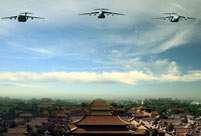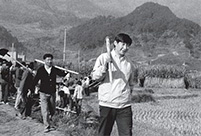 Top 100 beauties in the world!
Top 100 beauties in the world!
 Gallery: Who is the most beautiful one?
Gallery: Who is the most beautiful one?
 If you like autumn, put your hands in the air!
If you like autumn, put your hands in the air!
 Fan Bingbing's "Queen style" in new play
Fan Bingbing's "Queen style" in new play
 Lingerie show at 2014 Miss China
Lingerie show at 2014 Miss China
 J-10 fighters show aerobatic stunts in smog-free sky
J-10 fighters show aerobatic stunts in smog-free sky
 Charming contestants of Shanghai Int’l Model Contest
Charming contestants of Shanghai Int’l Model Contest
 Most amazing chi-pao beauties
Most amazing chi-pao beauties
 7 deadly animal attacks
Russia to launch 70 Proton rockets by 2020: official
7 deadly animal attacks
Russia to launch 70 Proton rockets by 2020: officialDecoding the Chinese Path
We have created an institutional civilization that boasts unique features and advantages.
As the miracle of China’s development has received increasingly high levels of attention and China’s international influence has continued to grow, “decoding China” has become a popular topic of discussion among the international community. How has China done it? How has the Communist Party of China done it? Questions such as these have frequently been the subject of much thought.
The path a country takes and the system it employs are closely linked to one another. Without the right system to support it, the success of a path would be impossible. China’s unique system was derived from a process of “washing away the sand to reveal the gold.” Since the advent of modern times, China has tried on “shoes” of all shapes and sizes. At one point, it even sought to copy the system of the West. None of these, however, resulted in success. It was not until the birth of the Communist Party of China that things really began to change. Through their bitter explorations, the Chinese people, led by the Communist Party of China, have discovered the path of socialism with Chinese characteristics; formulated its theoretical framework and established the Chinese socialist system. Compared with other systems, China’s system has shown marked advantages in a number of areas, being demonstrative of an institutional civilization with unique features and advantages.
First, our system is highly rational and effective with regard to decision-making and enforcement. The capacity of a country to make decisions and enforce them constitutes an important criterion for gauging the merits of that country’s system. Nothing can be achieved when decisions are made one minute and then changed the next on a whim. In a recent interview, former Afghan President Hamid Karzai said that if Afghanistan had the opportunity to choose again, it would certainly choose a Chinese-style path of development. This was because it was highly effective in taking action, resolute in its decision making, and results-oriented. These remarks shed light on one of the most prominent advantages of China’s system. Our system is able to focus on the overall interests of the people and the long-term development of the country. It ensures that decisions can be made rationally and promptly; enforced efficiently and effectively; and that a balance of continuity and innovation can be attained. Each of China’s Five-Year Plans, for instance, is formulated through a process of consultations among all interested parties, with opinions being conveyed upwards and then fed back downwards time and again until a consensus is reached and a decision is made.
The huge capacity of China’s system for action is even more evident in cases where we are able to pool national strength to carry out major undertakings and overcome major adversities. During our response to the devastating Wenchuan earthquake in Sichuan Province in 2008, for instance, the entire country rushed into action upon the calls of the CPC Central Committee, and this quickly culminated in a disaster relief effort of monumental proportions. As a result, we were able to mount an effective reconstruction effort within a relatively short period of time.
Second, our system boasts extensive and effective people’s democracy. Our democracy is people’s democracy. Solving problems through consultation, addressing the concerns of the many through the consultation of the many, and finding common ground with regard to the wishes and demands of society as a whole – these are the essential aspects of people’s democracy. China implements a fundamental political system of people’s congresses, and a set of basic political systems which include the system of multi-party cooperation and political consultation under the leadership of the CPC; the system of regional ethnic autonomy; and the system of community-level self-governance. Our country’s socialist democracy is realized through two key forms: on the one hand, the people exercise their rights by participating in elections and casting their votes; and on the other, people enjoy a multi-level institutionalized consultative democracy on an extensive basis. These forms of democracy are not only supported by complete institutional procedures; they also feature complete participation in practice. They are conducive to ensuring that the Party is able to lead the people in effectively governing the country; that the people are able to engage in day-to-day political activities on a sustained basis; that the people are able to participate in democratic elections, decision-making, management, and supervision in accordance with the law; and that the cooperation and coordination of various social forces can be strengthened.
In contrast, the flaws and limitations of Western-style democracy – which is primarily characterized by the multi-party system and the separation of legislative, executive, and judicial powers – are becoming increasingly evident. Even some Western scholars have acknowledged that Western-style democracy has experienced a profound crisis in recent years, with the balancing function of democracy becoming an impediment to the exercise of power and contention between rivaling parties holding national interests to ransom. Some countries which blindly “transplanted” Western-style democracy, or which had it “infused” from the outside, have been plagued by repeated changes of government and social turbulence, resulting in the “death of democracy.” There can be no democratic system more reliable or effective than one that is rooted in a country’s soils and preserved by the rich nutrients drawn therefrom.
Therefore, it is important that we stay clear-headed and maintain our political resolve on this issue. We cannot afford to neglect what is basic in favor of what is trivial, or to imitate others at the expense of what makes us unique.
Third, our system allows for the selection and appointment of people whose moral character and competence have been put to the test at various levels of office. Over the course of long-term explorations, we have developed a vibrant mechanism for the selection and appointment of competent people with sound moral character, which allows us to enlist outstanding talents from all walks of life to the various causes of the Party and state. Before assuming posts of leadership, officials at all levels are required to undergo a rigorous process that consists of official evaluation, democratic recommendation, and competitive selection. All officials in leading posts have been tested over time and tempered through the course of their work; they all have gained a broad range of work experience and an outstanding record at low-ranking posts. The tests that leading officials must undergo were vividly depicted in the short animation How Leaders Become Leaders, which took the web by storm. Now, the Chinese “Kung-fu” style practice of selecting and appointing people whose moral character and competence have been tempered on a long-term basis is increasingly receiving recognition from people of insight around the world.
Fourth, our system allows the “invisible hand” of the market and the “visible hand” of the government to work together as one. China practices a socialist market economy whose most distinguishing feature is the joint emphasis on the role of the market and that of the government. In other words, it seeks to make good use of both the “invisible hand” and the “visible hand.” This institutional arrangement not only observes the general rules of the market economy, but also makes up for its deficiencies such as blindness, spontaneity, and hysteresis. In doing so, it effectively links together the role of the market and that of the government. Relying on this system, we have presented the world with stunning performances of our socialist market economy. Some countries, in contrast, have turned to the cure prescribed by neoliberalism, indulging in all-out liberalization, privatization, and marketization in spite of their local realities. As a result, these countries have descended into a developmental trap from which they find it hard to escape. With the broadening of our experience and the deepening of our understanding, our Party has proposed the critically important theory of “enabling the market to play the decisive role in the allocation of resources and the government to exert its role more effectively.” With this, we have scientifically redefined the relationship between the market and the government. This will surely help the constant deepening of China’s economic reform and bring the advantages of the socialist market economy further into play.
In his speech to mark the 60th anniversary of the National People’s Congress, General Secretary Xi introduced an important criterion for judging whether or not the political system of a country is democratic and effective. According to this criterion, the decisive progress that China has made constitutes a convincing performance. Facts have demonstrated that China’s system, with its huge advantages, tenacity, vitality, and potential, has added to and developed the institutional civilization of human society. Some overseas scholars have pointed out that the Western model of development is currently reverting back to its original state as a regional development model. The success of China’s system has ushered in a new era of plurality in which different systems exist side by side and compete with one another. Even Francis Fukuyama, known for his “end of history” theory, suggests that the Chinese model has important advantages not found in the democratic systems of the West, and that a place should be reserved for China in the treasure trove of human thinking.
 |  |
 Female soldiers
Female soldiers Hot girls at motor show
Hot girls at motor show  Official trailer of Y-20
Official trailer of Y-20 Photos: Xi Jinping in Fujian
Photos: Xi Jinping in Fujian Standard faces for each countries
Standard faces for each countries China-made military transport aircraft gets ready
China-made military transport aircraft gets ready World Pole Dance Championship in China
World Pole Dance Championship in China Shocking! Photos of Chinese fighters revealed
Shocking! Photos of Chinese fighters revealed 59-year-old Liu Xiaoqing still looks stunning
59-year-old Liu Xiaoqing still looks stunning  Top 10 most dangerous jobs in the world
Top 10 most dangerous jobs in the world  Top 10 fifth generation jet fighters in the world
Top 10 fifth generation jet fighters in the world Top 10 Chinese goddesses
Top 10 Chinese goddesses  Top 20 hottest women in the world in 2014
Top 20 hottest women in the world in 2014 Top 10 pure beauties in showbiz
Top 10 pure beauties in showbiz  Top 10 world's highest-paid models 2014
Top 10 world's highest-paid models 2014 The most gorgeous Chinese women
The most gorgeous Chinese women Top 10 most handsome faces in Asia
Top 10 most handsome faces in AsiaDay|Week|Month